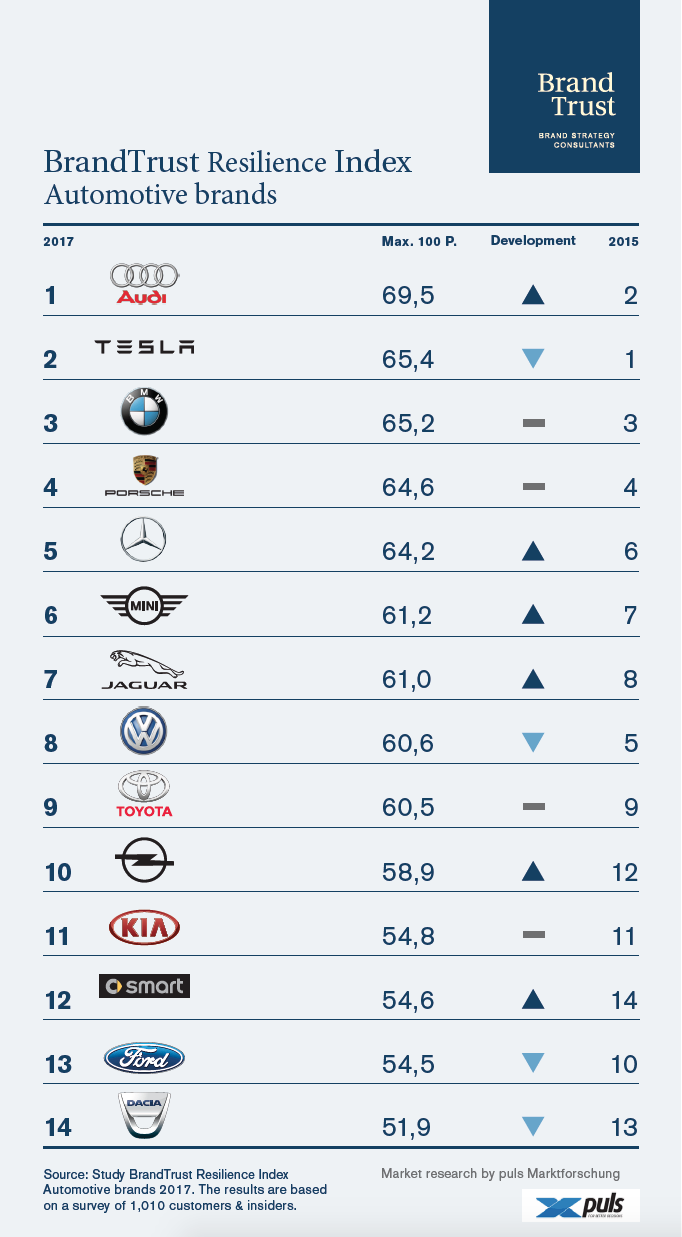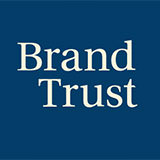
Despite Dieselgate: German car makers are viable – VW with reservations.
13. September 2017 ▪ Reading time: approx. 2:20 min.
Audi No. 1 in the ranking: Impressive brand loyalty
Even suspicions that Audi could be the hotbed of the emissions scandal could not shatter the respondents' trust in the brand. The big surprise: Audi improved in nearly all of the ten examined resilience criteria, including customer relationship with the brand. Audi logged the biggest increases in the indicators price premium (willingness to pay more for this brand) and in significance to society.
Sustainability of the brand VW is seriously questioned
The almost expected total crash of VW was dampened by receding, yet still relatively high marks in customer loyalty. After reaching 5th place in 2015, VW ended up in 8th in 2017 when exactly the same criteria were queried. Criteria relevant to readiness for the future have suffered substantially: Clearly declining confidence of survey respondents that VW will be able to maintain its sales or continuously increase them, and to offer new, complementary products and services. Adaptability showed alarming scores: Only Ford and Dacia did worse than VW.
Toyota is right on VW's heels
In its home market of Germany, VW is left with only a razor-thin lead over Toyota (VW 60.6/Toyota 60.5). For adaptability, Toyota is already rated higher than VW. Toyota also clearly beats VW regarding volume premium, i.e. the willingness of customers to also buy other products or services of the brand.
Tesla dethroned by Audi, but still with good ratings
Tesla, who took first place in the 2015 ranking of the most resilient automotive brands, had to cede that position to Audi in 2017. Apparently customers, unlike the stock exchange, care about real experiences, not just the missionary power of Elon Musk. It is becoming apparent that the willingness to pay higher prices for Tesla has declined – in contrast to Audi or Mercedes. Tesla's top ratings in terms of sustainability, social relevance, and indispensability are remarkable, however. Here, the challenger from the USA beats all of the German premium automotive brands.
German automotive brands: Positive ratings for the future – except for VW
Audi, Mercedes, and Mini scored higher marks in the current BrandTrust Resilience Index than they did in 2015. A glance at the results shows the reasons:
Excellent products, clear positioning, and impressive experiences revolving around the brand appearances. Porsche and BMW defended their positions in the ranking with minimal losses. Opel improved, but in the overall ranking of brands remains at the bottom of the list. This is reflected by the brand's current profitability.
"Well positioned brands are protective shields during times of crisis," technology brand expert and study author Jürgen Gietl explains. This is demonstrated by the scores of all German auto makers – except VW. Brand expert Gietl sees the cause in the insufficiently articulated positioning of the brand VW and the fact that VW is perceived as the ringleader of the scandal.
Great optimization potential for all examined auto makers
The top ranks and the positive development of German automotive brands should not gloss over the fact that there is great potential for optimization. Audi, ranked No. 1, scores less than 70 of 100 possible points in the assessment of brand resilience. The study thus also reveals that not nearly all opportunities of the brands for shaping the future, for customer and multiplier loyalty, and for conveying specific peak performances are being seized, and that the role of the brand as an engine for change is also not recognized and used sufficiently.
Statements by study initiator Jürgen Gietl on the significance of brands in times of transformation and disruption:
There have always been crises caused by technical defects or recalls in the automobile industry. The current challenges, however, have a new dimension: Systematic defrauding of customers, the perhaps forced departure from a propulsion technology, and social changes that already question the meaning of property. The transition is happening at all levels. At times like these, the brand can offer guaranteed stability to customers and employees.
A brand is more than a logo and communication. It not only accounts for a significant portion of a company's value. An attractive brand attracts the right skilled professionals, which companies in the VUCA world need more urgently than ever.
A functioning brand generates more trustworthiness than the managers behind it, as is plain to see by the example of Audi.
You would like more information on the study? Please feel free to send us an email.















